Gong Qianyun - Tahan Queen!
*Note - 'Tahan' in Singaporean colloquial English means 'to put up strong resistance' or 'to endure'.
It was a successful event at the QCD-Prof Lim Kok Ann Grandmasters Invitational 2018 (June 7th-12th, 2018) for Singapore. After two whole decades, the country successfully conducted a GM norm event. Singapore also has a new WGM in Gong Qianyun. Besides, IM Kevin Goh Wei Ming clinched his 3rd and final GM norm by finishing with 6½/9, a half point behind the eventual winner Mongolian GM Tsegmed Batchuluun.
We managed to rustle up personal interviews with both players who are, incidentally, the National Champions of Singapore. Firstly, the Singapore women champion WIM Gong relates about her tourney experience and a bit about her personal life.
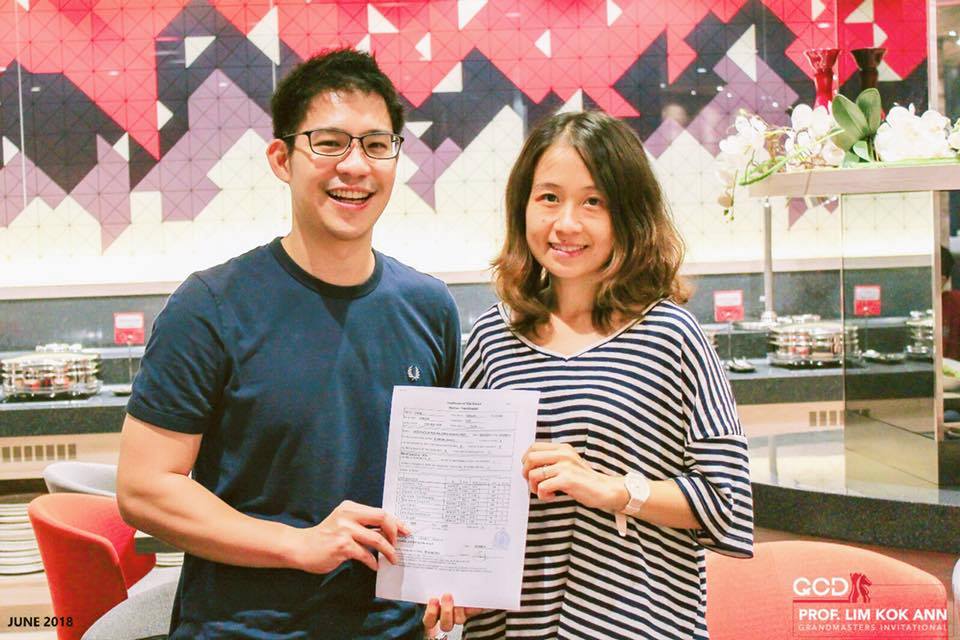
WIM Gong Qianyun being presented with her 3rd and final WGM norm by Dr Mark Liew, chairman of QCD-Prof Lim Kok Ann GMs Invitational committee | Photo: Official Website
JT: You took a long time before deciding to accept the invitation to take part in the event. Why was that?
GQ: I did not feel confident about performing well. I have not been playing in events since last December and have had very less time to commit to chess training in the past few months.
JT: How did you feel about competing in a GM norm event where you were out-rated by everyone and likely to be the player everyone would want to score against?
GQ: It is easier to say 'I’m busy with my students, thanks anyway' and choose an easier event to play instead, right? Being the lowest-rated relieved me of pressure and allowed me to focus on the game itself. I did not expect much from the event to start with.
JT: Your first round was against the top seed GM Timur Gareyev, who, at 2611, outrated you by 300+ points. And he was just throttling you and forced you to give up material. What were your thoughts then? What changed things for you?
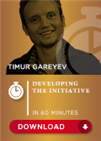 Dynamic play is what makes your chess effective and most importantly fun! Timur Gareyev shows severeal examples which aspects are important to remember when seizing for the initiative!
Dynamic play is what makes your chess effective and most importantly fun! Timur Gareyev shows severeal examples which aspects are important to remember when seizing for the initiative!GQ: He was playing very well and I came out inferior from the opening. Call it a stroke of luck if you will but he did not manage to find the correct moves to convert his advantage. This allowed me to make a comeback in the game.

Garayev vs Gong, round 1 | Photo: Junior Tay
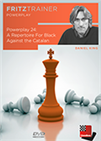 On this DVD Grandmaster Daniel King offers you a repertoire for Black against the Catalan, based around maintaining the rock of a pawn on d5. Keeping central control ultimately gives Black good chances to launch an attack against the enemy king.
On this DVD Grandmaster Daniel King offers you a repertoire for Black against the Catalan, based around maintaining the rock of a pawn on d5. Keeping central control ultimately gives Black good chances to launch an attack against the enemy king.JT: Were you confident of making the WGM norm then?
GQ: I did not ponder too much over it. I was more focused on playing each game well.
JT: It was almost four years since your WGM norm from the Tromso Olympiad. What changed things in this event to make this norm happen?
GQ: Nothing much has changed. I guess it is about not having much opportunity to take part in a strong tournament like this since the Tromso Olympiad. I am really grateful to the organizers for holding such a great event.
JT: After holding three of the top four seeds in the first three rounds, you subsequently lost to IM Irene Sukandar and GM Batchuluun. It must have been quite depressing for you then. How did you cope with it?
GQ: I try not to think too much about the losses and instead focus on the upcoming games.
JT: You won the TAHAN (best resistance) award for saving the game against Timur and for that amazing turnaround against IM Liu Xiangyi (on move 56, the computer says you were -54.48 down). How did you build up this ability to resist? I don’t think we saw that aspect of your game in previous events before.
GQ: I think I was just lucky here. I tried to find the best continuations and was lucky that my opponents allowed me a chance to get back into the game, unlike previous events.
JT: In the crucial final round, you needed to beat IM Tin Jingyao, who is surely a very tough opponent to overcome. You didn’t look too self-assured at all then. However, when the game began, you just played without fear and when he attacked you in the middlegame, you confidently pushed him back and hardly gave him a chance to recover. How did that happen?
GQ: From the opening, I managed to get the upper hand. I had an extra pawn and my opponent did not have compensation for it. After that, I constantly reminded myself to be more careful in this crucial round as I've had a long history of losing games when I have the advantage. [You'll find the annotated game below. -Ed.]

Qianyun was in a must-win situation in the final round against Tin Jingyao | Photo: Junior Tay
JT: Who do you wish to thank for making the WGM title and why?
GQ: I would like to thank my family. They had to spend more time with the kids at my place to allow me to focus on the tournament. I also like to thank Kevin for encouraging me to not give up and for helping me prepare me for the crucial final round game.
JT: How do you intend to celebrate the long cherished WGM title?
GQ: I think I shall wait for the title confirmation before celebrating. Perhaps by having a sumptuous meal with my family.
[The norm was confirmed at the FIDE Presidential Meeting in Bucharest, Romania, earlier this month. -Ed.]
JT: Would you like to show us any games from the event?
GQ: I think my game against Jinyao was my best in the tournament. The rest I’m just tahan-ing…
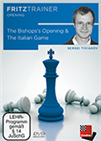 Studying the content of this DVD and adding these openings to your repertoire will provide players with a very strong tool to fight 1...e5 - as the practice of the author clearly demonstrates.
Studying the content of this DVD and adding these openings to your repertoire will provide players with a very strong tool to fight 1...e5 - as the practice of the author clearly demonstrates.JT: How did you pick up chess? Who trained you in your early years of chess?
GQ: It was a random opportunity I had when I was 7. Chess was assigned as an extra-curriculum activity in China. Mr Liang Qiaoyang was my first coach. The training mainly consisted of memorizing classical games on a daily basis. When we failed to memorize correctly, we had to wash the toilet. Perhaps that’s why I was motivated to excel. I only began formal training three years later in Guangdong chess team.
JT: When did you get good at chess?
GQ: In around 2004-2005 when I entered China’s national team.
JT: Why did you choose to be a chess trainer / National player in Singapore?
GQ: It was an opportunity that brought me to Singapore. I was less competitive back then and more into kids’ chess training. While in Singapore, I realized that I am still very much in love with chess. Hence, I started to be more active in local tournaments and gradually became Singapore’s national champion.
JT: Can you tell us a bit about your family? Does your husband play chess — does he stand a chance against you?
GQ: I have a husband and two kids, and they have been supportive of my chess career. My husband played competitive chess when he was younger but is rather inactive these days. He stands a chance when I’m not paying attention!
JT: Are you going to train your kids to become chess masters?
GQ: I have not thought that far but knowing that chess is good for kids’ intellectual development, I am motivated to teach them chess. Whether they develop a passion for it, later on, will be up to their interest.
JT: How do you train now?
GQ: I am reviewing my opening repertoire and trying to improve my endgame and positional sense.
JT: Does being a chess trainer make your ability to improve at chess more difficult?
GQ: Being a chess trainer often gives me a fresh perspective on various positions and actually helps in improving my chess as I have to learn new positions to teach my students.
JT: Do you ever regret choosing life as a chess professional as a career? Would you have done things differently if you could restart again?
GQ: No. If I could, I would have worked harder in my younger years to have a stronger foundation in chess.
JT: Why do you always say “Women’s endgame” when you get outplayed in the endgame against strong opponents?
GQ: This is a saying arising from women chess players having a stronger likelihood to lose an equal position in endgames. Sometimes, it just cannot be explained. Of course, it’s just a generalization, there are many women grandmasters who are very good at endgames.
JT: One last question: what advice would you give to girls who aspire to be strong at chess since there are so many more boys in it?
GQ: Although there may be physical differences, when it comes to chess, women are not mentally weaker. So, be confident! And play good chess!
Kevin Goh: after six long years
It took six long barren years for Singaporean IM Kevin Goh Wei Ming before nailing down the final GM norm at the QCD-Prof Lim Kok Ann GMs Invitational 2018, but it was all the sweeter for him in achieving it on home ground. Here he relates the good, the bad and the ugly that he went through before and during the event and talks a bit about his future plans.
JT: So, six years to finally clinch your 3rd and final GM norm. What were the first thoughts that went into your mind when IM Liu Xiangyi reached out his hand to accept the draw offer that gave you the required half point? What is the first thing you did after handing in your scoresheet?
KG: I am just relieved that it is over. Around the point where we were exchanging pieces on d5, I kind of understood that my opponent was agreeable to a draw and it was even clearer once we reached the rooks and opposite-coloured bishop endgame. After the game, I switched my attention to the clutch game between WIM Gong and IM Tin where the former needed to win in order to complete her WGM requirements.
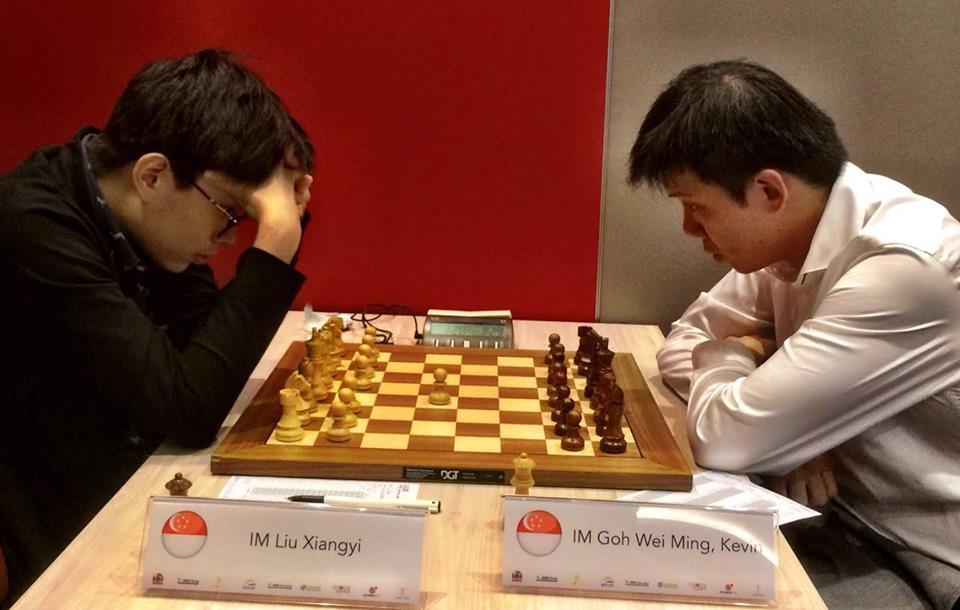
The game that earned Kevin his final GM norm | Photo: Junior Tay
JT: During the event, you were constantly plagued by insomnia and you also mentioned the stress of being unable to ‘breathe properly’. Can you describe what transpired (why did you feel so pressured) and how did you overcome this tension?
KG: I always have a lot of pressure when I am playing in GM events given the fact that I already have two norms and that I had come close on several other occasions. This event was extra special to me since I was playing in my home country and it would have really meant something if I could turn in a good result. It got really bad after round four when I was sitting on plus two and I was going to take two whites on the next day knowing that I needed to score at least one win in order to keep the momentum going. I didn’t really manage this stress very well and could only sleep at two am despite feeling really tired from all the preparatory work. Thankfully, it somehow all came together in the end.
JT: How sure were you of making the norm before the event? At which stage did you realize your goal was within reach and how did you approach the situation?
KG: Not sure at all! I understood that a lot of things have to come together in order for me to successfully achieve a norm. I think luck is definitely important in events like this. I was certainly not taking anything for granted going into this tournament.
My initial strategy was to start fast by scoring 3/3 and then take it from there. I mean no disrespect to my fellow Singaporeans but it is always important to start well in a GM norm tournament as the confidence that you gain will almost always prove to be invaluable. At one point in my game against Gong, I honestly thought my chances of losing were substantially higher than my making a draw which is nothing less than what my play had deserved. I understood that losing that game would be absolutely detrimental to my chances and I told myself that no matter what, I had to find something to hang on to. Fortunately, I managed to find sufficient tricks to hold on. But it is not all good fortune, as some had commented — it is also skill and resilience that allowed me to salvage a draw. In many ways, I am more proud of that game than my victories.
I understand there were some puzzled comments on why we agreed to a draw in the final position. Well, if you have only looked at the game superficially and with the engine on, you would think that white is winning but of course, the position was already very close to being drawn.

Kevin had a tough time defending his game against WIM Gong Qianyun | Photo: Junior Tay
 The Rossolimo Variation of the Sicilian Defence (1.e4 c5 2.Nf3 Nc6 3.Bb5) is always an excellent choice with White if you want to avoid the deeply analysed main lines of the Open Sicilian. Alexei Shirov provides you with the requisite understanding of the opening's subtleties, by annotating extensively his most important games in this variation. During his career, he has played the 3.Bb5 system with both colours and he shares with you on this DVD his valuable experience.
The Rossolimo Variation of the Sicilian Defence (1.e4 c5 2.Nf3 Nc6 3.Bb5) is always an excellent choice with White if you want to avoid the deeply analysed main lines of the Open Sicilian. Alexei Shirov provides you with the requisite understanding of the opening's subtleties, by annotating extensively his most important games in this variation. During his career, he has played the 3.Bb5 system with both colours and he shares with you on this DVD his valuable experience.I was severely rattled that I was so close to losing against the bottom seed but there was very little time to feel sorry for myself as there was a second game in the afternoon, this time against co-National champion Tin Jingyao. Obviously, I had played Tin many times in the last few years and it is getting very difficult to surprise him with anything. My main preparation was to take a shower and have a good sleep as I figured that our game was likely going to be an extremely long one. As it turns out, Tin was the first to surprise me by playing a system that as far as I know, he has never tried before in official tournament games.

Kevin's prep against Tin Jingyao comprised of a shower and some good sleep | Photo: Junior Tay
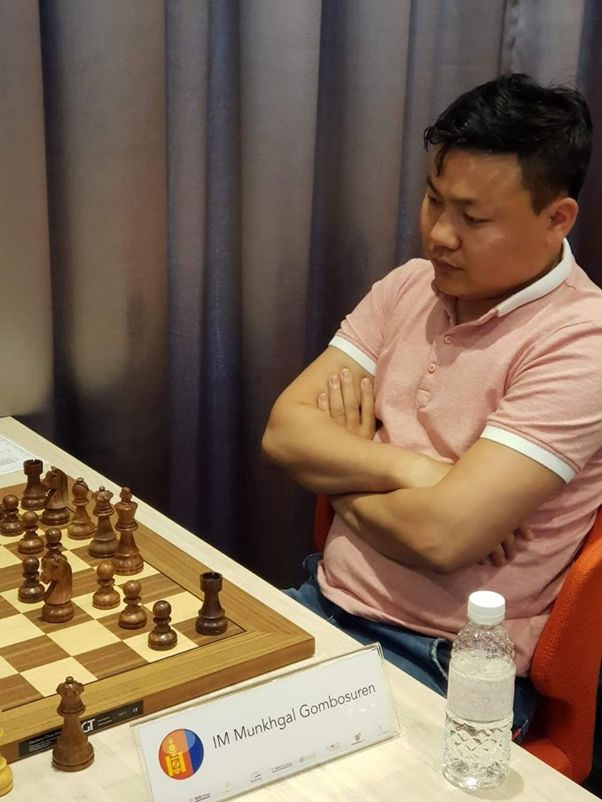 And then in round five, I took the white pieces against the combative Mongolian player, IM Munkghal Gombosuren. I had known the guy for many years and he is a really talented player who works very hard on and off the board and I knew it will take something special to beat him. He was very close to making a double norm at the Baku Olympiad and it is clear that he can beat anyone on his day.
And then in round five, I took the white pieces against the combative Mongolian player, IM Munkghal Gombosuren. I had known the guy for many years and he is a really talented player who works very hard on and off the board and I knew it will take something special to beat him. He was very close to making a double norm at the Baku Olympiad and it is clear that he can beat anyone on his day.
Before this event, I had prepared 3.Nd2 against the French extensively as a surprise and he wanted to counter surprise me with the rather dubious Guimard variation. Thankfully, I had studied this line in some detail and managed to catch my opponent off-guard. Again, the game appeared to be a rather smooth one but I speak from my own experience that the position is just really difficult to handle and it is easy to go downhill quickly. After the game, I was eager to tell my opponent that I had faced this exact set-up before, but with the Black pieces against GM Thomas Luther in 2013! People were puzzled with some of his moves but trust me, I knew exactly what he was going through!
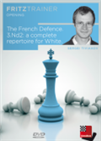 Build a first-class repertoire against the French with the help of one of its leading exponents in a new interactive video format! Includes tests with video feedback for every move. A must have for anyone wanting to beat the French with 3.Nd2!
Build a first-class repertoire against the French with the help of one of its leading exponents in a new interactive video format! Includes tests with video feedback for every move. A must have for anyone wanting to beat the French with 3.Nd2!After this rather nerve-wracking game, my approach was just to take it slow and try and push for a win at opportune moments. I made an early draw offer against GM Nguyen Ahn Dung as I didn't like my chances in that endgame although I probably should have played a few more moves just to see how the game can go. Both Thomas Luther and Nigel Short questioned my decision and probably they are right since they have been around much longer than me!
It was especially difficult to play against Irine, given that we have known each other for more than ten years and she is almost like a chess sister...if there is such a thing. I guess I had some luck in that round given that she had just beaten GM Timur Gareyev famously...under the most unlikely circumstances possible which meant that she retained a sliver of hope of making a GM norm. She had to win the last three rounds so she really went after my throat. Luckily, her sacrifices were a gamble that I would crack under time pressure but fortunately, those sacrifices were over-speculative.
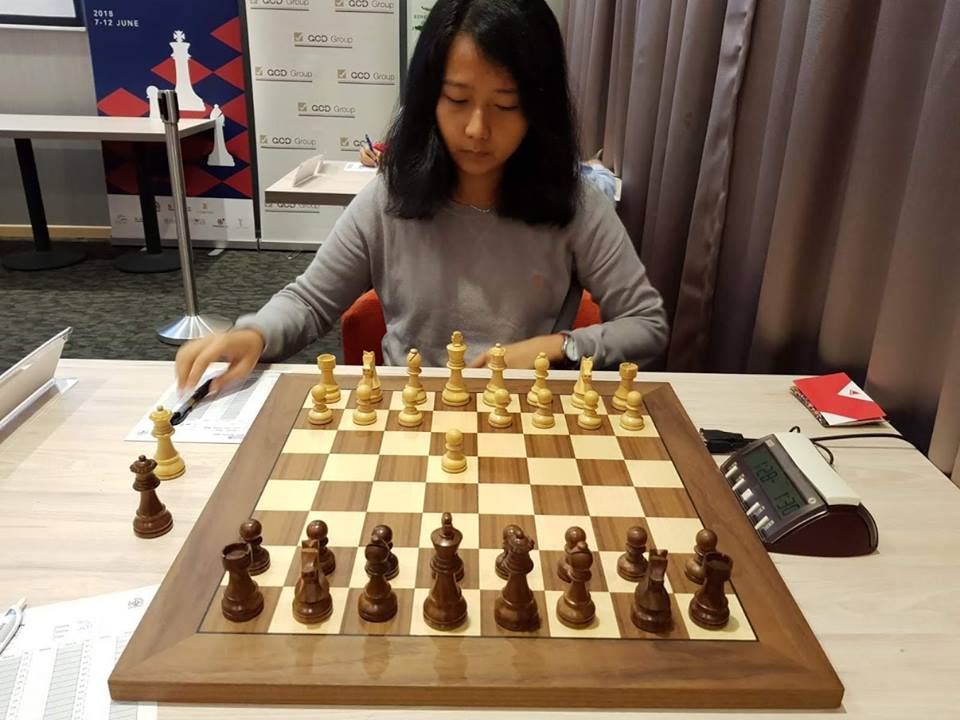
Irene Sukandar tried some crafty tricks to confuse her opponent | Photo: Junior Tay
JT: You completed a marathon right before the event. What made you take up running and was it geared towards improving your chess results or concentration?
KG: It has been well documented in many works that physical fitness is absolutely critical to a chess player's performance, especially in the final phase of the game. I am going to be 35 very soon and my opponents in my most recent tournaments seem to be getting younger and younger.
Clearly, I had to find an equaliser and see how I can keep up in terms of energy and concentration level and I eventually decided on running. I had always been an avid runner and my best 2.4km timing was just under nine minutes. A chess game is very much like a marathon and you have to keep telling yourself to push forward. Stamina and not speed is critical. Under the advice of fellow chess-club Balestier members Li Yang and Chong Ghee, I installed the RunKeeper app and started going on regular 10km runs. Then, my colleagues from Lucence Diagnostics had set up a running club and so we all signed up for half-marathons and full marathons this year. Funnily enough, I saw the pairings for this tournament on the day of the Sundown marathon so my thoughts during the 7-hour gruelling run were mainly a mixture of deciding when to give up and what openings to play!
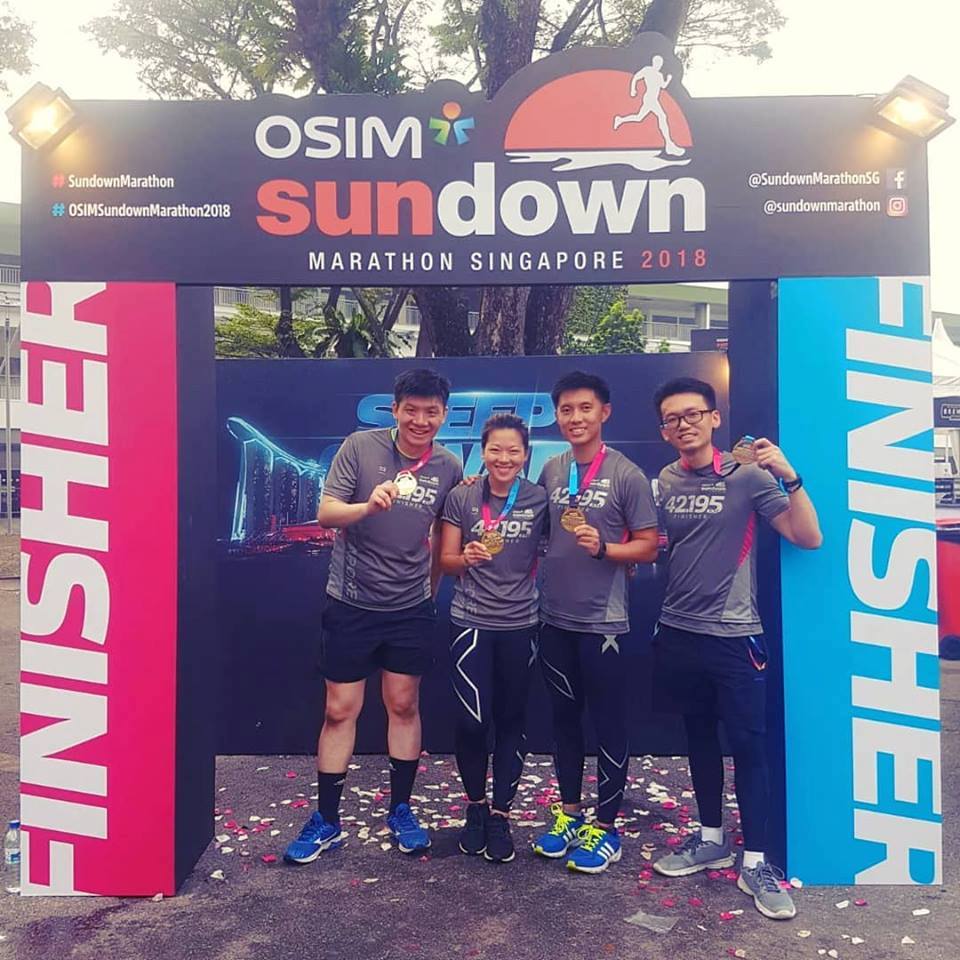
After completing the Osim Sundown Marathon 2018 | Photo: Junior Tay
JT: Was there a different approach you took towards this event and the previous other GM norm attempts you made during the barren years that made your chances better (preparation, mindset, living conditions etc)?
KG: No, not really. Knowing the pairings in advance obviously helped and I spent a long time considering my options in the opening. Otherwise, it was the same type of regime that I had used in the past — solving an hour of calculation exercises every day and delving deeply into opening preparation. The only issue is that none of my opening prep proved to be really useful as everyone had decided to do something abnormal against me. I would highly recommend anyone about to play a GM event to work on Chapter 9 of GM Preparation — Calculation by Jacob Aagaard. It is a collection of exceptionally difficult exercises and it was fun for me trying to solve them.
In terms of conditions, it was a matter of making my life as comfortable as possible. Booking a room at the official hotel was a good idea as that saved me a fair amount of time and energy — I didn’t fancy driving to Stevens Road during peak hours at all.
JT: How do you juggle work as a CFO for Lucence and chess training/studying at IM/GM level? Can one really multitask like this without consequences?
KG: My CEO (Dr. Tan Min-Han) is really understanding and supportive and he also wanted me to achieve my dream of becoming a Grandmaster. I do whatever I can during workdays, having shorter lunches and looking at some chess in the evening to the best of my ability.
JT: Of course, there is the matter of the 7 additional Elo points to complete the GM title requirements. Aside from that, what other chess aspirations do you have subsequently?
KG: I still enjoy playing and I still want to improve my game. I no longer have any major ambitions, like breaking 2600 but I would like to maintain my strength of around 2500-2550. Breaking IM Tan Lian Ann’s incredible record of ten National Champion titles is my immediate goal and in the long run, I would love to work with our most promising juniors.
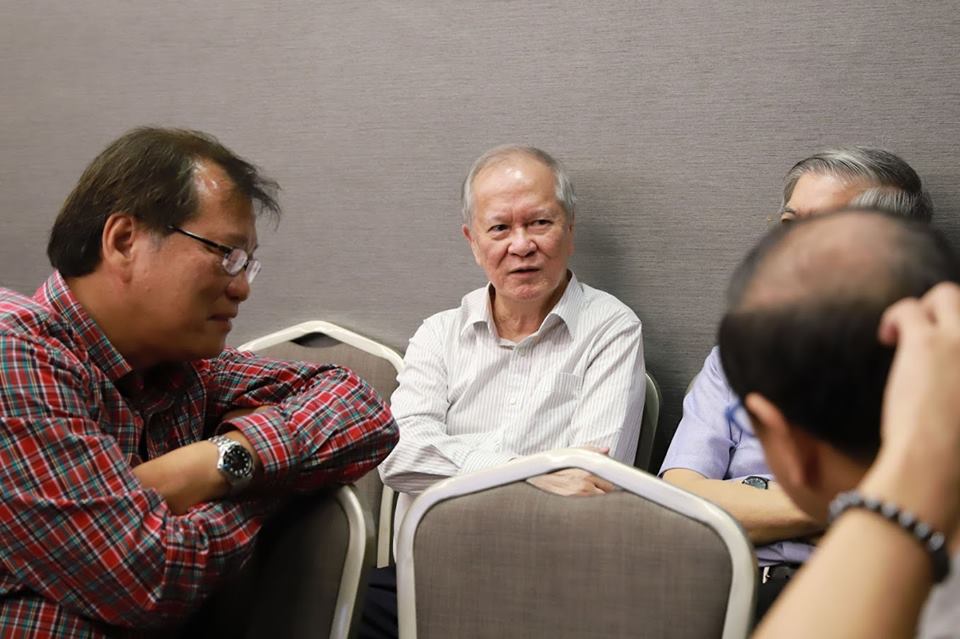
IM Tan Lian Ann — Singapore's ten-time national champion | Photo: Junior Tay
JT: We noticed that you were dressed very spiffily (coat, formal attire) for the entire event. What gives?
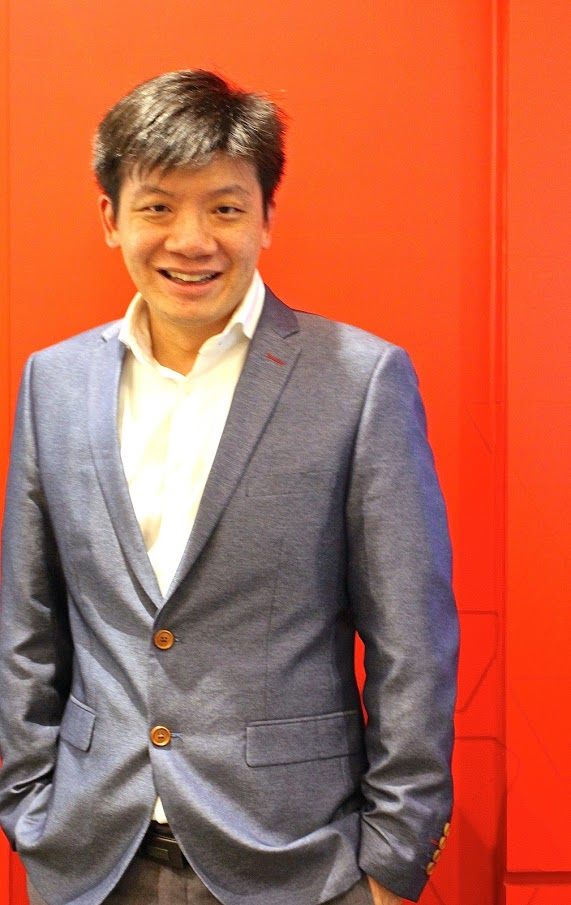
KG: Well, I figured that if I can’t play well, at least I am dressed for the occasion! All jokes aside, this is the strongest and best tournament that was organised in Singapore for a few decades and I just wanted to show my respect.
JT: How do you deal with losses? There were some really heart-breaking ones weren’t there, which rendered your chances for the norm into toast?
KG: I have gone through what many others have gone through before me — suffer one heart-breaking loss while being on the brink of making a norm. I don’t really have any specific recommendations on how to deal with it, except to talk to your friends and hope that they have encouraging things to say? IM Tibor Karolyi told me that the fact that I have come close on a few occasions already means something, and the experience I gain will be invaluable when dealing with the next clutch game.
I guess the most important thing to do is to keep believing in yourself and keep working at it. Most of the time, hard work will pay off.
Links
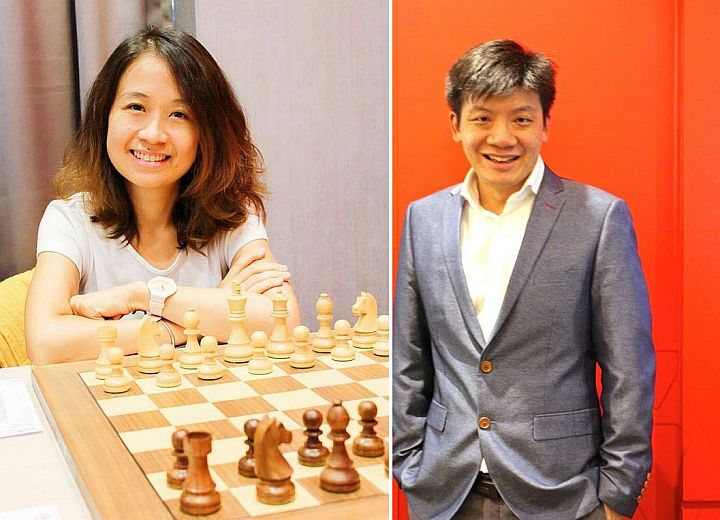























 And then in round five, I took the white pieces against the combative Mongolian player, IM Munkghal Gombosuren. I had known the guy for many years and he is a really talented player who works very hard on and off the board and I knew it will take something special to beat him. He was very close to making a double norm at the Baku Olympiad and it is clear that he can beat anyone on his day.
And then in round five, I took the white pieces against the combative Mongolian player, IM Munkghal Gombosuren. I had known the guy for many years and he is a really talented player who works very hard on and off the board and I knew it will take something special to beat him. He was very close to making a double norm at the Baku Olympiad and it is clear that he can beat anyone on his day.








